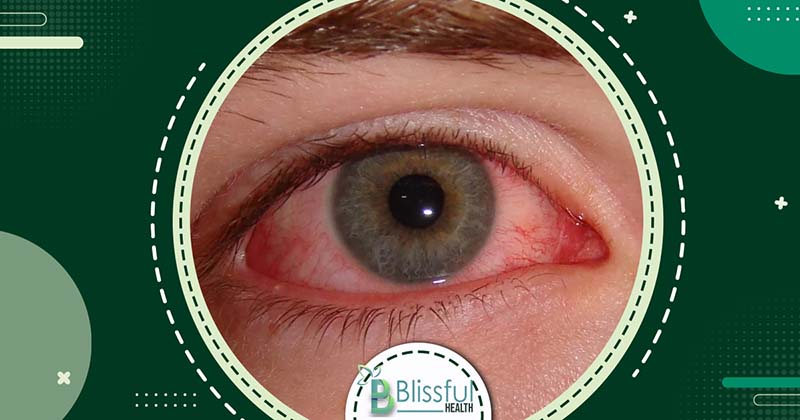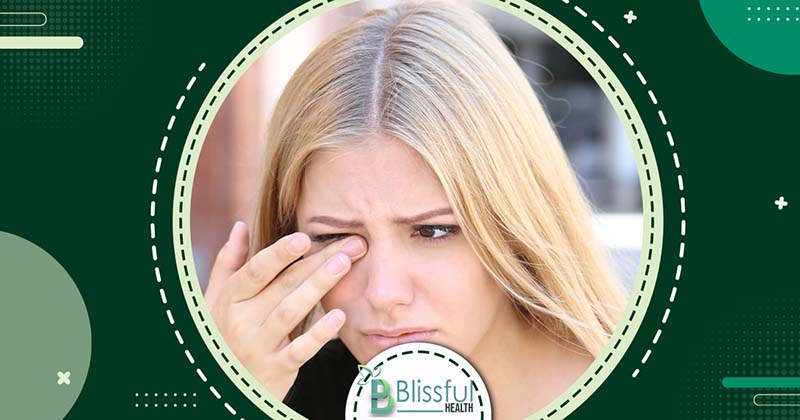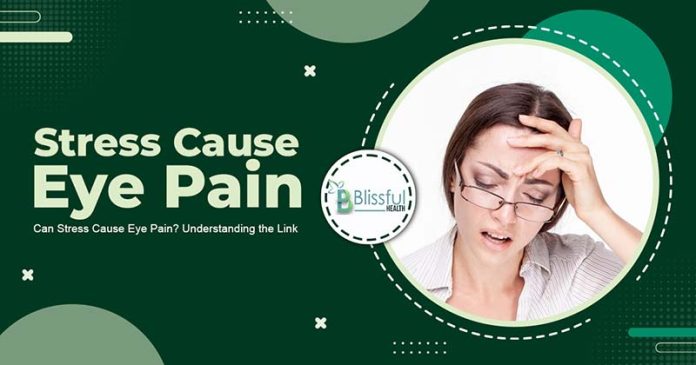Can stress cause eye pain? Eye discomfort may present as a dull, sharp pain or general discomfort and may be associated with stress and anxiety disorders, including hysterical attacks.
Feeling the connection between stress and eye symptoms, such as stress and fatigue, is important for maintaining mental and eye health. We at Blissfulhealth realize how anxiety affects your eyes and plays a vital role in managing your overall health.
How Does Stress Affect Vision?
Feeling stressed, worried, or fearful triggers your body’s fight-or-flight response, gearing you up to handle potential threats. This physiological reaction also extends to the eyes and visual system, often resulting in eye strain and headaches.
Numerous studies and clinical trials have highlighted that stress heightens the risk of vision loss due to various eye conditions, including glaucoma, optic neuropathy, diabetic retinopathy, and age-related macular degeneration. Understanding how stress affects vision underscores the importance of managing stress for maintaining eye health.

Symtoms of Vision Problems
Sudden or Gradual Eye Pain: Experience a dull or sharp pain in one or both eyes, which may last for a moment, a few seconds, or persist for minutes or hours.
Duration of Pain: Sometimes, dull pain or aches in the eyes can persist for days before subsiding.
Accompanying Redness: Eye aches or pains may be accompanied by redness in one or both eyes, or they may show no signs of redness at all.

Muscle-Related Pain: Eye pain can also be associated with the muscles controlling eye movement, leading to discomfort when moving your eyes or looking in one direction. This symptom is often linked with the pain of “eye strain” (Read more about the article on eye strain.).
Affected Eyes: Symptoms can affect one eye only, shift to affect the other eye, migrate back and forth between eyes, or simultaneously affect both eyes.
Recognizing these symptoms of vision problems is crucial for seeking timely medical attention and ensuring optimal eye health.
How to Prevent Visual Problems Caused by Stress?
To mitigate the impact of stress on your vision, consider these practical tips:
Practice Relaxation Techniques: Engage in activities like yoga, meditation, or deep breathing exercises to calm your mind and alleviate stress.
Regular Exercise: Incorporate regular physical activity into your routine to reduce stress levels and enhance blood circulation to your eyes.

Take Screen Breaks: Give your eyes a break from prolonged screen exposure by taking frequent pauses from computer or mobile screens. This helps in reducing eye strain and alleviating dry eyes.

Use Protective Eyewear: Shield your eyes from environmental factors such as dust, UV rays, and pollution by wearing sunglasses and other protective eyewear when necessary.
Maintain a Healthy Diet: Include foods rich in vitamins A, C, and E, as well as omega-3 fatty acids, to promote good eye health and combat the effects of stress on vision.
Regular Eye Exams: Schedule regular eye examinations with an optometrist or ophthalmologist to detect any eye problems early on and prevent potential vision loss.
Incorporating these practices into your lifestyle can help manage stress and protect your vision from its adverse effects.
How to Effectively Reduce Stress?
If you’re grappling with stress or anxiety and notice frequent changes in your eyes, consider scheduling a comprehensive eye exam with your ophthalmologist. They can provide relief for uncomfortable eye symptoms and address any underlying conditions.
When it comes to reducing stress and anxiety, stick to methods backed by science:
Practice Deep Breathing: Incorporate deep breathing exercises into your daily routine to promote relaxation and reduce stress levels.

Regular Exercise: Engage in regular physical activity to release endorphins and alleviate stress. Aim for activities you enjoy, such as walking, jogging, or dancing.
Mindfulness Practices: Explore mindfulness techniques like guided meditation to cultivate present-moment awareness and soothe your mind.
Limit Social Media Use: Reduce your time spent on social media platforms, as excessive usage can contribute to stress and anxiety. Set boundaries and allocate designated screen-free periods.
Connect with Loved Ones: Foster connections with friends and family members to share experiences, seek support, and strengthen your social support network.
Seek Professional Help: If stress begins to impact your work or relationships, don’t hesitate to reach out to your primary care physician or a mental health specialist for guidance and support.
By incorporating these evidence-based strategies into your daily life, you can effectively manage stress and cultivate a greater sense of well-being.
How to Relax Your Eyes?
Blink More Often: Prolonged screen exposure can lead to dry eyes, causing headaches, eye strain, and blurry vision. Combat this by consciously increasing your blink rate. When engaged with screens, blink more frequently to lubricate your eyes and refresh your brain for better visual processing.
Palm for Relaxed Vision: Cup your hands over your eyes gently to create a soothing pressure. Close your eyes and focus on the darkness, allowing all residual colors to fade away. Hold this position for at least 30 seconds to reset your vision, lubricate your eyes, and promote relaxation.
Trace an Eight: Visualize a large figure-eight shape about 10 feet away from you. Slowly trace its outline with your eyes, first clockwise and then counterclockwise. This exercise enhances the flexibility of your eye muscles and contributes to clearer vision over time.
Roll Your Eyes: Move your gaze from right to left, then up and down, in a smooth motion. Repeat this process, alternating directions. Additionally, try drawing geometric figures with your gaze to exercise your eye muscles. Repeat five to ten times to alleviate eye strain.
Follow the 20-20-20 Rule: To prevent digital eye strain, take a 20-second break every 20 minutes and focus on an object at least 20 feet away. This simple exercise helps relax your eyes and prevents long-term eye damage.
Focus on Objects Near and Far: Remove your glasses and focus on various objects at different distances. Start by focusing on your thumb up close, then at arm’s length, followed by objects across the room and even further away. Spend 2 seconds on each object, ensuring they’re all aligned along the same line of sight. This exercise helps maintain healthy vision and prevents visual lethargy.
How to Effectively Take Care of Your Eyes at Home?
Avoid Rubbing Your Eyes: Resist the urge to rub your eyes, especially when they’re itchy or irritated. Rubbing transfers bacteria and harmful particles from your hands to your eyes, increasing the risk of infections. Additionally, it can cause dilation of blood vessels, leading to dark circles and puffiness.

Maintain a Balanced Diet: Consume a diet rich in fruits and vegetables to protect your eyes from diseases like cataracts and macular degeneration. Nutrients like vitamins A, C, and E, as well as antioxidants, play key roles in maintaining eye health.
Get Sufficient Sleep: Prioritize adequate sleep to support good eye health. Insufficient sleep can result in dry, red, and swollen eyes, along with the development of dark circles. Moreover, it increases the likelihood of eye strain, fatigue, and certain eye diseases.

Keep Your Surroundings Clean: Maintain cleanliness in your surroundings to prevent dust, dirt, and other particles from causing irritation and dryness in your eyes. Allergens such as mold, pollen, and pet dander can also contribute to eye problems, so ensure proper cleanliness to minimize exposure.
Practice Frequent Hand Washing: Regular handwashing is crucial for eye care. Your hands encounter various bacteria and harmful particles throughout the day, and touching your eyes can transfer these, leading to infections. Wash your hands frequently, especially before touching your eyes or applying makeup, to reduce the risk of eye-related issues.
Conclusion
In conclusion, addressing the question, “Can stress cause eye pain?” is crucial for those experiencing symptoms linked to anxiety disorders such as panic attacks. Understanding and managing the effects of anxiety on the eyes are vital steps towards improving both mental and ocular health.
By acknowledging the impact of stress, individuals can take proactive measures to alleviate eye discomfort and enhance their overall well-being.


